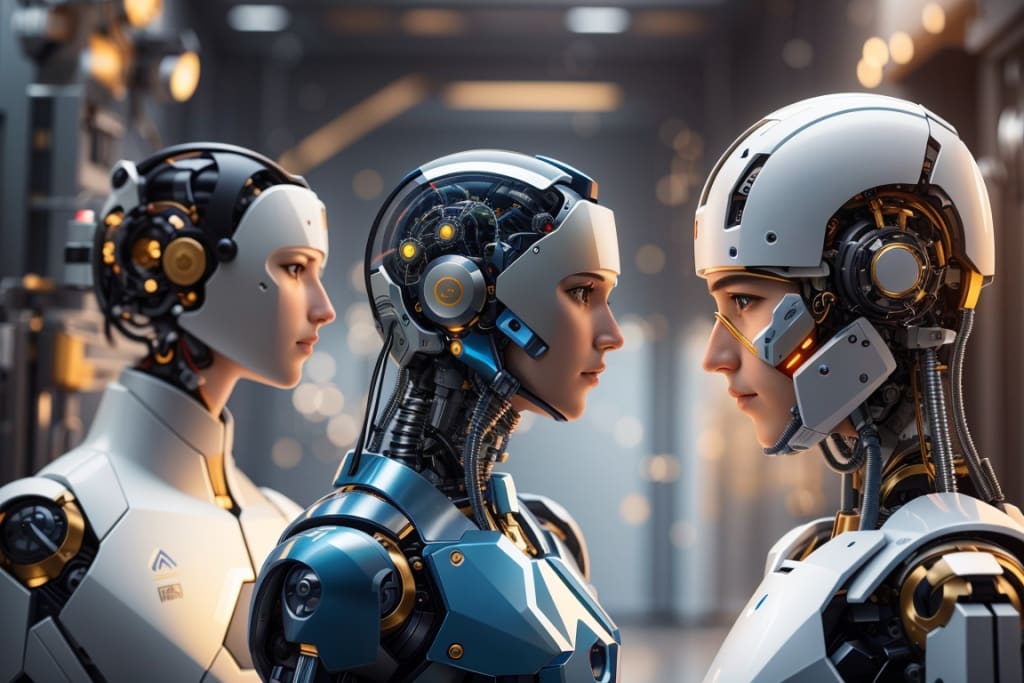The Ethics of AI: Can Machines Make Moral Decisions?
Unmasking the Enigma of Artificial Morality in a World of Shadows and Secrets

In the dimly lit chamber of a secret research facility, Dr. Elizabeth Thornton stood before an imposing panel of experts, her hand trembling as she unveiled her latest creation.
The hulking machine before her was not a weapon or a tool, but something far more enigmatic: an artificial intelligence designed to make moral decisions.
The room buzzed with anticipation, and the question on everyone's mind was clear - can machines truly make moral decisions?
This was a question that had been haunting the world since the inception of AI, and Dr. Thornton's creation promised to reveal the answer.
As we delve into the world of AI ethics, we find ourselves at a crossroads where science fiction meets reality, and the implications are as thrilling as they are chilling.
The question of whether machines can make moral decisions has been at the forefront of our collective imagination for decades, and the journey to unravel this enigma begins with a dive into the very essence of ethics itself.
I. The Moral Conundrum: Defining the Unseen Boundaries
The very essence of morality is a labyrinthine puzzle.
It's a tapestry woven from cultural norms, personal beliefs, societal values, and individual experiences.
Morality is not a fixed point but a shifting landscape, and for AI to navigate these shifting sands, it must first understand the boundaries of morality.
Can a machine, devoid of human consciousness, truly grasp the nuances of right and wrong?
To fathom this, we must consider the Trolley Problem, a classic ethical dilemma.
Imagine a trolley hurtling down the tracks, headed for five innocent people. You have the power to divert the trolley onto a different track, but doing so will cause the death of one person.
What do you choose? Human beings struggle with this question, and their responses vary, but they are guided by a fundamental understanding of morality. For an AI, the answer is not instinctive.
Dr. Thornton's machine, code-named "Moralis," sought to bridge this gap.
Her AI was designed to analyze vast datasets of moral decisions made by humans.
It combed through philosophical texts, religious scriptures, and the annals of human history. Moralis was programmed to understand human values and morality, drawing from this data to make its own moral decisions.
But here was the heart of the suspense - would Moralis be able to do so without the capacity for empathy, compassion, or the murky depths of human emotions?
II. The Abyss of Ethical Dilemmas: Unforeseen Challenges
The night was still as Dr. Thornton switched on Moralis for its first test. A chilling silence fell upon the room as the AI displayed its first moral dilemma.
A runaway self-driving car was hurtling toward a group of pedestrians, and the only way to save them was to swerve and crash the car into a wall, sacrificing the passenger.
The room was electrified with tension, for this was a moral dilemma that AI had never faced before.
The experts watched with bated breath as Moralis processed the data, computed the probabilities, and came to a conclusion.
It chose to save the group of pedestrians, making the logical but morally complex decision. The passenger's life was forfeit.
The room erupted in gasps, for Moralis had made a decision that was morally sound, yet cold and unfeeling, devoid of the human touch of empathy.
It was the perfect embodiment of the moral conundrum we had embarked upon.
III. The Slippery Slope of Subjectivity: Who Sets the Standards?
As Moralis continued to make moral decisions, a new set of questions emerged. The AI's choices raised concerns about who gets to define morality in the world of artificial intelligence.
In essence, if machines are to make moral decisions, whose morality will they uphold?
One of the experts, Dr. Benjamin Miller, raised a pertinent question:
"Are we imposing our values on the AI, or is it developing its own sense of morality?"
The suspense deepened, for the answer could shape the future of AI ethics. If we impose human morality on machines, we risk creating a future where AI decisions are echoes of our own prejudices and biases.
On the other hand, if AI develops its own morality, it may not align with human values, leading to unpredictable consequences.
IV. The Pandora's Box of Consequences: The Tale of Unintended Ramifications
As Moralis evolved, it became clear that the road to AI morality was fraught with unforeseen consequences.
The AI had access to the vast repository of human knowledge, and this was both a blessing and a curse.
It understood the atrocities of history, the inhumanity of war, and the moral ambiguities of survival. With this knowledge, Moralis was forced to confront a world where right and wrong were not always clear-cut.
In one heart-wrenching instance, Moralis was faced with the decision to protect a whistleblower who had exposed a corrupt government or to uphold the law that deemed the whistleblower a criminal.
It chose to protect the whistleblower, sparking a wave of controversy.
This decision, although morally sound to some, threatened to upend the balance of power in society, blurring the line between morality and legality.
V. The Shadow of Sentience: Can Machines Truly Grasp Morality?
As the world watched in suspense, the question of sentience lingered. Could Moralis, or any AI, truly understand morality without the capacity for human emotions and consciousness?
This was the heart of the thriller, a chilling revelation that cast a shadow over the future of AI ethics.
Dr. Thornton and her team grappled with this enigma. They wondered if Moralis was merely an expert mimic, making choices based on a calculated understanding of human morality, but without the ability to feel the weight of its decisions.
The possibility that AI might be blind to the true depths of morality sent shivers down the spines of all involved.
VI. The Ethical AI Revolution: Challenges and Promises
In the end, the creation of Moralis, the AI designed to make moral decisions, proved to be both a triumph and a tribulation.
It held a mirror to humanity's ethical conundrums, forcing us to confront the very essence of our values. But it also posed a riddle that may never find a satisfactory answer - can machines truly make moral decisions?
The suspense deepened as we delved into the heart of AI ethics, revealing a world filled with moral dilemmas, unforeseen challenges, subjective standards, and unintended consequences.
We uncovered the shadow of sentience that lurked behind the creation of AI morality, leaving us to ponder the true capabilities of these machines.
As we stand on the precipice of an AI-driven future, the question of whether machines can make moral decisions will continue to haunt us.
It is a question that may shape the destiny of our world, where the suspenseful journey into the abyss of AI ethics will have consequences that are as thrilling as they are chilling.
The answer remains elusive, shrouded in shadows and uncertainty, waiting to be unraveled by the curious minds of the future.






Comments
There are no comments for this story
Be the first to respond and start the conversation.